Test in production without watermarks.
Works wherever you need it to.
Get 30 days of fully functional product.
Have it up and running in minutes.
Full access to our support engineering team during your product trial
URL encoding and decoding are techniques used in the C# to ensure the safe transmission of data within URLs. In C#, these operations are commonly encountered when dealing with web applications, API calls, or any scenario where data needs to be passed through the internet securely and reliably. In this article, we'll explore the URL encoding method and the IronPDF library.
When you encode a URL, you change its characters into a form that can be safely sent across the internet, avoiding any misunderstandings. This is because URLs can only be sent over the Internet using the ASCII character set. Characters that aren't part of this set, or have special meanings in URLs (like spaces, ampersands, and equals signs), need to be represented using percent-encoding (e.g., spaces become %20). C# provides built-in methods to accomplish this task.
URL decoding transforms encoded characters back to their original state upon arrival at their destination. This is essential for the receiving application to correctly understand and process the data as intended. Decoding turns the percent-encoded characters back into their original symbols, making the data readable and usable again.
In C#, there are multiple ways to perform URL encoding, each suited for different scenarios. These methods are primarily found within the System.Web and System.Net namespaces, offering developers flexibility in how they encode URLs. Here's a brief overview of the methods available:
Let's understand the first three encoding methods as described above, and their working by understanding their code examples.
using System;
using System.Web;
class Program
{
static void Main()
{
string originalPath = "/api/search/Hello World!";
string encodedPath = UrlEncode(originalPath);
Console.WriteLine("Original Path: " + originalPath);
Console.WriteLine("Encoded Path: " + encodedPath);
}
public static string UrlEncode(string originalString)
{
return HttpUtility.UrlEncode(originalString);
}
}using System;
using System.Web;
class Program
{
static void Main()
{
string originalPath = "/api/search/Hello World!";
string encodedPath = UrlEncode(originalPath);
Console.WriteLine("Original Path: " + originalPath);
Console.WriteLine("Encoded Path: " + encodedPath);
}
public static string UrlEncode(string originalString)
{
return HttpUtility.UrlEncode(originalString);
}
}Imports System
Imports System.Web
Friend Class Program
Shared Sub Main()
Dim originalPath As String = "/api/search/Hello World!"
Dim encodedPath As String = UrlEncode(originalPath)
Console.WriteLine("Original Path: " & originalPath)
Console.WriteLine("Encoded Path: " & encodedPath)
End Sub
Public Shared Function UrlEncode(ByVal originalString As String) As String
Return HttpUtility.UrlEncode(originalString)
End Function
End ClassNamespace Inclusion: The System.Web namespace is included at the beginning of the code.
Original String: We define a string variable originalString containing the characters to encode for safe transmission in a URL. This includes spaces and punctuation marks that could potentially cause issues if included in a URL without encoding.
Encoding: The HttpUtility.UrlEncode method is called with originalString as its argument. This method processes the string and returns a new string where unsafe characters are replaced with their percent-encoded equivalents. For example, spaces are replaced with %20.
Output: Finally, the program prints both the original and encoded strings to the console.

using System;
using System.Web;
class Program
{
static void Main()
{
// Define the original URL path, which includes spaces.
string originalPath = "/api/search/Hello World!";
// Use the HttpUtility.UrlPathEncode method to encode the path.
string encodedPath = HttpUtility.UrlPathEncode(originalPath);
// Output the original and encoded paths to the console.
Console.WriteLine("Original Path: " + originalPath);
Console.WriteLine("Encoded Path: " + encodedPath);
}
}using System;
using System.Web;
class Program
{
static void Main()
{
// Define the original URL path, which includes spaces.
string originalPath = "/api/search/Hello World!";
// Use the HttpUtility.UrlPathEncode method to encode the path.
string encodedPath = HttpUtility.UrlPathEncode(originalPath);
// Output the original and encoded paths to the console.
Console.WriteLine("Original Path: " + originalPath);
Console.WriteLine("Encoded Path: " + encodedPath);
}
}Imports System
Imports System.Web
Friend Class Program
Shared Sub Main()
' Define the original URL path, which includes spaces.
Dim originalPath As String = "/api/search/Hello World!"
' Use the HttpUtility.UrlPathEncode method to encode the path.
Dim encodedPath As String = HttpUtility.UrlPathEncode(originalPath)
' Output the original and encoded paths to the console.
Console.WriteLine("Original Path: " & originalPath)
Console.WriteLine("Encoded Path: " & encodedPath)
End Sub
End ClassCharacter Entity Equivalents in URL Encoding: The process shown transforms the string value of a URL path, converting spaces into their character entity equivalents (%20) for web compatibility. This is crucial because URLs cannot contain actual space characters.
String Value and URL String Handling: The originalPath variable's string value is "/api/search/Hello World!", which is a typical example of a URL string needing encoding due to the inclusion of spaces.
Although this example uses a specific version of HttpUtility.UrlPathEncode without method overloads, it's important to note the method's design intention for encoding URL paths. Developers should be aware of method overloads when they exist, as they provide alternative ways to use a method, often by accepting different types of input or providing additional functionality.
Encoding Object and String URL Transformation: The encoding object in this context is implicit in the HttpUtility.UrlPathEncode method's operation, which takes a string URL and returns its encoded form. This method ensures that the structure of the URL path remains intact while encoding special characters to their appropriate representations.
Encoded Path Output: The program demonstrates the transformation from the original path to the encoded path. This is a direct example of encoding a string URL to adapt it for web transmission, addressing the potential issues spaces and other special characters might introduce.
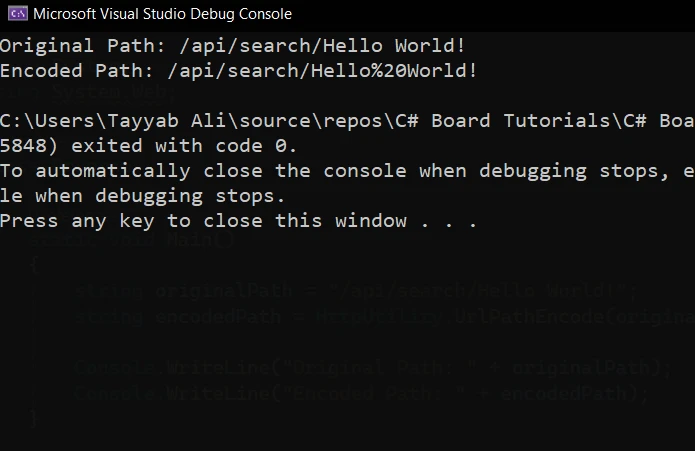
using System;
class Program
{
static void Main()
{
string originalUri = "https://example.com/search?query=Hello World!";
string escapedUri = Uri.EscapeUriString(originalUri);
Console.WriteLine("Original URI: " + originalUri);
Console.WriteLine("Escaped URI: " + escapedUri);
}
}using System;
class Program
{
static void Main()
{
string originalUri = "https://example.com/search?query=Hello World!";
string escapedUri = Uri.EscapeUriString(originalUri);
Console.WriteLine("Original URI: " + originalUri);
Console.WriteLine("Escaped URI: " + escapedUri);
}
}Imports System
Friend Class Program
Shared Sub Main()
Dim originalUri As String = "https://example.com/search?query=Hello World!"
Dim escapedUri As String = Uri.EscapeUriString(originalUri)
Console.WriteLine("Original URI: " & originalUri)
Console.WriteLine("Escaped URI: " & escapedUri)
End Sub
End ClassOriginal URI: The originalUri variable is initialized with a string representing a full URI, including a query string with spaces and special characters. To ensure the URI is correctly processed by web browsers and servers, these special characters need to be 'escaped'.
Escaping the URI: The Uri.EscapeUriString method is invoked with originalUri as its argument. This method scans the URI string and escapes characters that are not allowed or could cause ambiguity in a URI.
Output: The program prints both the original and the escaped URI to the console.

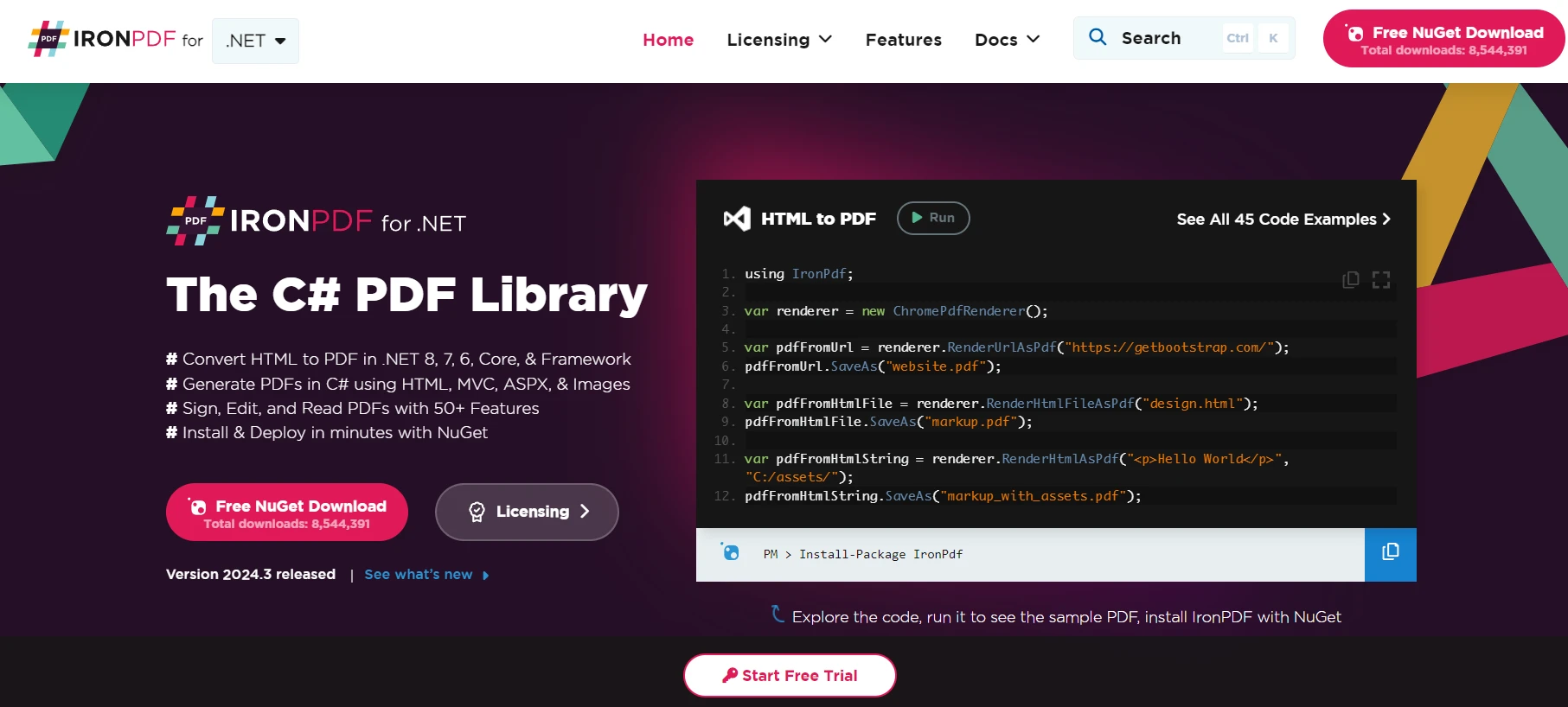
IronPDF is a PDF library that simplifies creating, editing, and manipulating PDF files within .NET applications. Designed to seamlessly integrate with C# and VB.NET, IronPDF offers developers the functions to generate PDFs from HTML or directly from text. Whether you need to automate invoice generation, create dynamic reports, or manage documents in a .NET environment, IronPDF stands out for its ease of use and comprehensive set of features.
The highlight of IronPDF is its HTML to PDF Conversion feature, maintaining your layouts and styles. This allows for PDF creation from web content, perfect for reports, invoices, and documentation. HTML files, URLs, and HTML strings can be converted to PDFs easily.
using IronPdf;
class Program
{
static void Main(string[] args)
{
var renderer = new ChromePdfRenderer();
// 1. Convert HTML String to PDF
var htmlContent = "<h1>Hello, IronPDF!</h1><p>This is a PDF from an HTML string.</p>";
var pdfFromHtmlString = renderer.RenderHtmlAsPdf(htmlContent);
pdfFromHtmlString.SaveAs("HTMLStringToPDF.pdf");
// 2. Convert HTML File to PDF
var htmlFilePath = "path_to_your_html_file.html"; // Specify the path to your HTML file
var pdfFromHtmlFile = renderer.RenderHtmlFileAsPdf(htmlFilePath);
pdfFromHtmlFile.SaveAs("HTMLFileToPDF.pdf");
// 3. Convert URL to PDF
var url = "http://ironpdf.com"; // Specify the URL
var pdfFromUrl = renderer.RenderUrlAsPdf(url);
pdfFromUrl.SaveAs("URLToPDF.pdf");
}
}using IronPdf;
class Program
{
static void Main(string[] args)
{
var renderer = new ChromePdfRenderer();
// 1. Convert HTML String to PDF
var htmlContent = "<h1>Hello, IronPDF!</h1><p>This is a PDF from an HTML string.</p>";
var pdfFromHtmlString = renderer.RenderHtmlAsPdf(htmlContent);
pdfFromHtmlString.SaveAs("HTMLStringToPDF.pdf");
// 2. Convert HTML File to PDF
var htmlFilePath = "path_to_your_html_file.html"; // Specify the path to your HTML file
var pdfFromHtmlFile = renderer.RenderHtmlFileAsPdf(htmlFilePath);
pdfFromHtmlFile.SaveAs("HTMLFileToPDF.pdf");
// 3. Convert URL to PDF
var url = "http://ironpdf.com"; // Specify the URL
var pdfFromUrl = renderer.RenderUrlAsPdf(url);
pdfFromUrl.SaveAs("URLToPDF.pdf");
}
}Imports IronPdf
Friend Class Program
Shared Sub Main(ByVal args() As String)
Dim renderer = New ChromePdfRenderer()
' 1. Convert HTML String to PDF
Dim htmlContent = "<h1>Hello, IronPDF!</h1><p>This is a PDF from an HTML string.</p>"
Dim pdfFromHtmlString = renderer.RenderHtmlAsPdf(htmlContent)
pdfFromHtmlString.SaveAs("HTMLStringToPDF.pdf")
' 2. Convert HTML File to PDF
Dim htmlFilePath = "path_to_your_html_file.html" ' Specify the path to your HTML file
Dim pdfFromHtmlFile = renderer.RenderHtmlFileAsPdf(htmlFilePath)
pdfFromHtmlFile.SaveAs("HTMLFileToPDF.pdf")
' 3. Convert URL to PDF
Dim url = "http://ironpdf.com" ' Specify the URL
Dim pdfFromUrl = renderer.RenderUrlAsPdf(url)
pdfFromUrl.SaveAs("URLToPDF.pdf")
End Sub
End ClassIn the following example, we'll see how to use IronPDF in conjunction with URL encoding to generate a PDF from a web page. The scenario involves encoding a URL to ensure it's correctly formatted for web requests, then using IronPDF to convert the content at that URL into a PDF document.
First, ensure you have IronPDF installed in your project. If you're using NuGet Package Manager, you can install it by running:
Install-Package IronPdf
Now, let's dive into the code:
using System.Web;
using IronPdf;
License.LicenseKey = "License-Key";
string baseUrl = "https://example.com/search";
// The query parameter with spaces that needs to be encoded
string query = "Hello World!";
// Encoding the query parameter to ensure the URL is correctly formatted
string encodedQuery = HttpUtility.UrlEncode(query);
// Constructing the full URL with the encoded query parameter
string fullUrl = $"{baseUrl}?query={encodedQuery}";
// Initialize the IronPDF HtmlToPdf renderer
var renderer = new ChromePdfRenderer();
// Convert the web page at the encoded URL to a PDF document
var pdf = renderer.RenderUrlAsPdf(fullUrl);
// Save the PDF to a file
string filePath = "webpage.pdf";
pdf.SaveAs(filePath);
Console.WriteLine($"PDF successfully created from: {fullUrl}");
Console.WriteLine($"Saved to: {filePath}");using System.Web;
using IronPdf;
License.LicenseKey = "License-Key";
string baseUrl = "https://example.com/search";
// The query parameter with spaces that needs to be encoded
string query = "Hello World!";
// Encoding the query parameter to ensure the URL is correctly formatted
string encodedQuery = HttpUtility.UrlEncode(query);
// Constructing the full URL with the encoded query parameter
string fullUrl = $"{baseUrl}?query={encodedQuery}";
// Initialize the IronPDF HtmlToPdf renderer
var renderer = new ChromePdfRenderer();
// Convert the web page at the encoded URL to a PDF document
var pdf = renderer.RenderUrlAsPdf(fullUrl);
// Save the PDF to a file
string filePath = "webpage.pdf";
pdf.SaveAs(filePath);
Console.WriteLine($"PDF successfully created from: {fullUrl}");
Console.WriteLine($"Saved to: {filePath}");Imports System.Web
Imports IronPdf
License.LicenseKey = "License-Key"
Dim baseUrl As String = "https://example.com/search"
' The query parameter with spaces that needs to be encoded
Dim query As String = "Hello World!"
' Encoding the query parameter to ensure the URL is correctly formatted
Dim encodedQuery As String = HttpUtility.UrlEncode(query)
' Constructing the full URL with the encoded query parameter
Dim fullUrl As String = $"{baseUrl}?query={encodedQuery}"
' Initialize the IronPDF HtmlToPdf renderer
Dim renderer = New ChromePdfRenderer()
' Convert the web page at the encoded URL to a PDF document
Dim pdf = renderer.RenderUrlAsPdf(fullUrl)
' Save the PDF to a file
Dim filePath As String = "webpage.pdf"
pdf.SaveAs(filePath)
Console.WriteLine($"PDF successfully created from: {fullUrl}")
Console.WriteLine($"Saved to: {filePath}")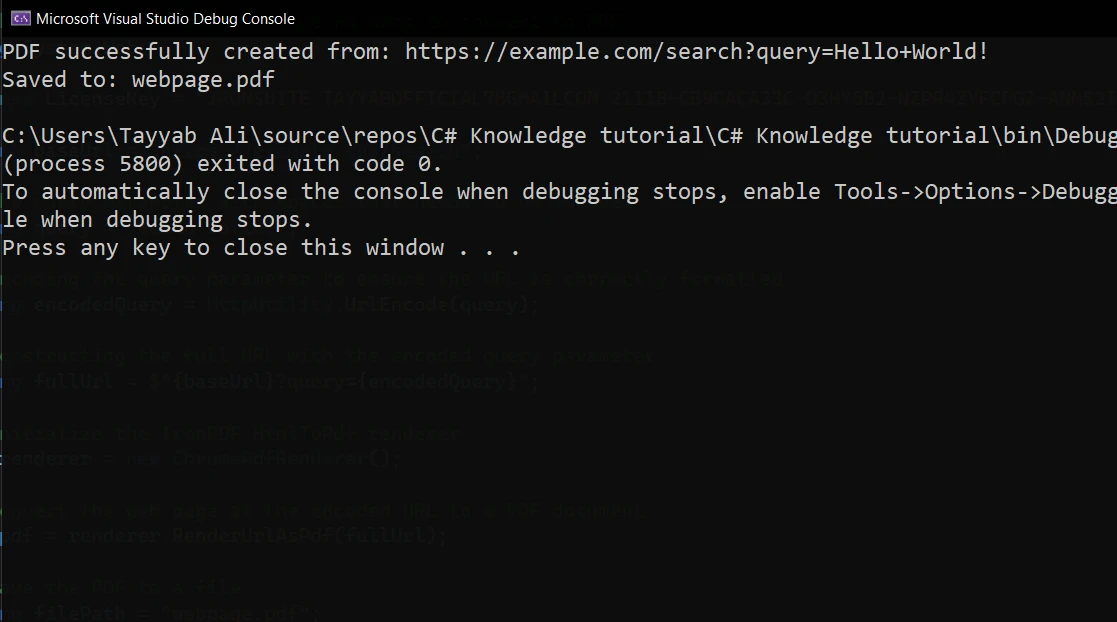
The example starts with a base URL and a query string containing spaces. The query string is encoded using HttpUtility.UrlEncode to ensure it's safely transmitted in the URL. After encoding the query, it's appended to the base URL to form the complete URL that will be accessed.
With the full, encoded URL ready, IronPDF's ChromePdfRenderer renderer is used to fetch the web page at that URL and convert it into a PDF document. This involves creating an instance of the ChromePdfRenderer class and then calling RenderUrlAsPdf with the encoded URL. Finally, the generated PDF is saved to a file using the SaveAs method. The resulting file is a PDF document of the web page content, accessible via the encoded URL. Here is the output PDF file:
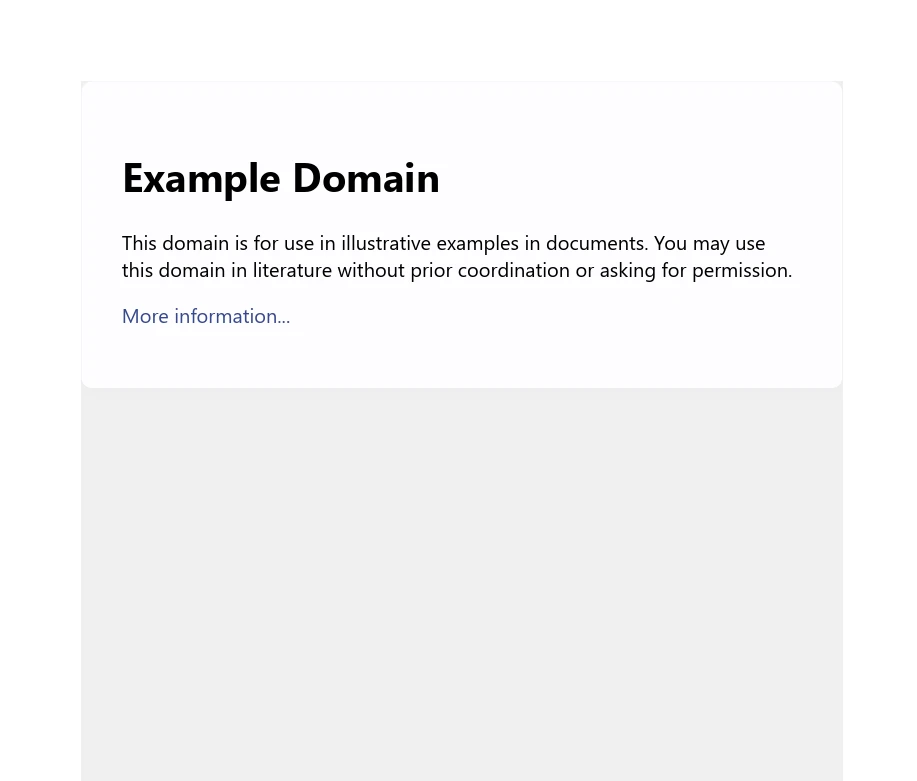
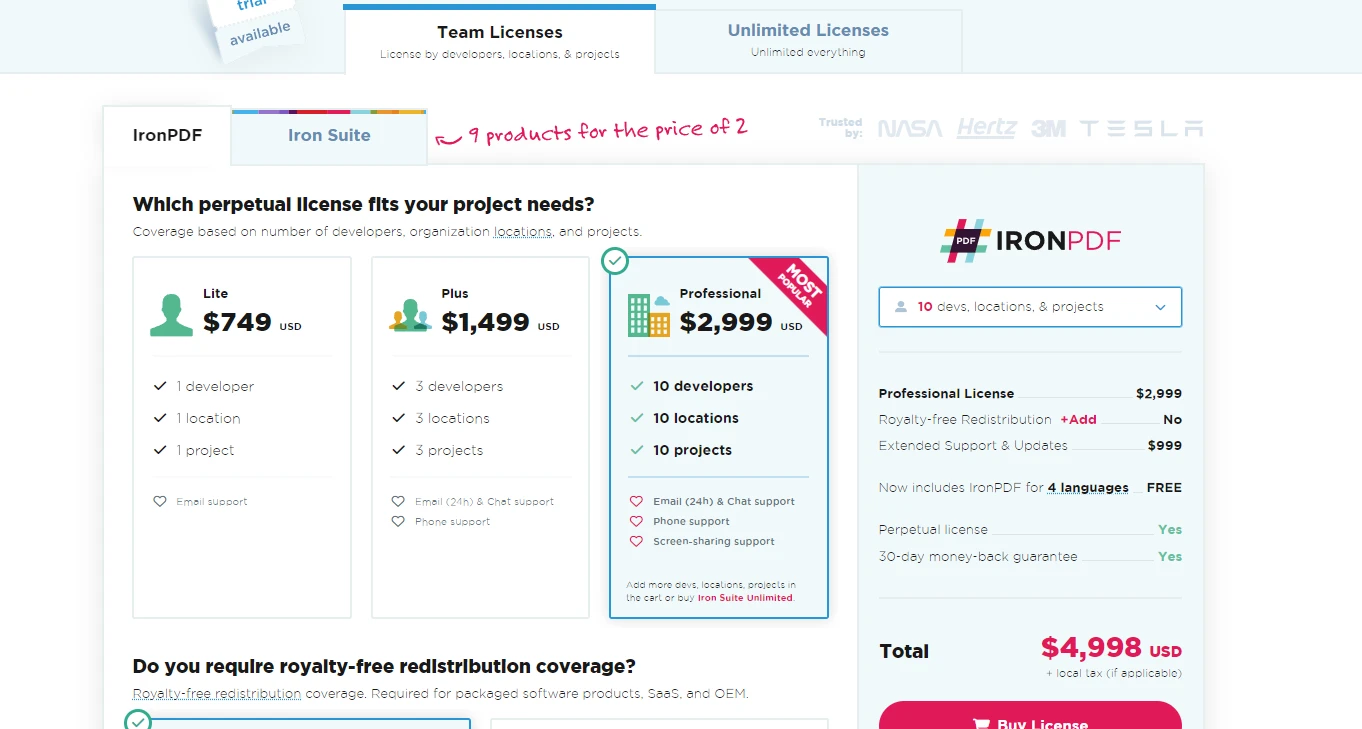
To wrap up, C# provides powerful capabilities for URL encoding and decoding, ensuring data can be securely and efficiently transmitted over the internet. Through the built-in methods within the System.Web and System.Net namespaces, developers can encode URLs to prevent issues with special characters and decode them to their original form for accurate data interpretation.
For those interested in exploring the IronPDF Trial License Offerings is available, providing an opportunity to evaluate its functionality firsthand. Should you decide to integrate IronPDF into your projects, licenses start at $749, offering a comprehensive suite of features to meet your PDF manipulation needs within the .NET framework.